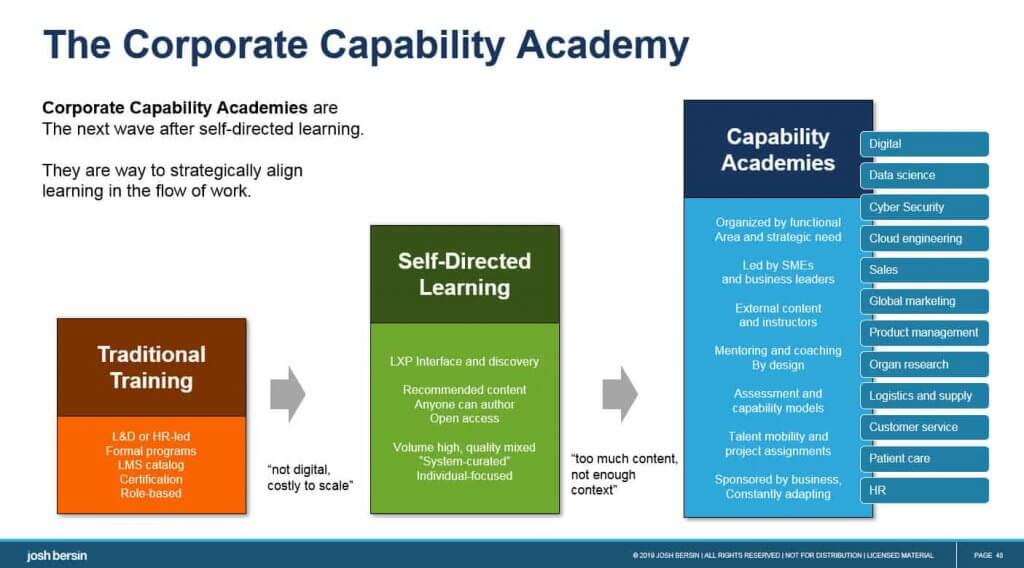Share
The word ‘experience’ has become very popular these days. You can buy travel experience packages, go to food experience places, and try out sports experience as well. Experiences have something in common: they go further than the usual thing.
You can travel to a place and go sightseeing with a powerful camera. However, if you buy an experience, you may go to unusual places, talk to different people, and enjoy it much more than the usual thing. Experiences like this are memorable and will most likely encourage you to do more or come back for more experiences (while you are reading this, you may remember some of your unforgettable experiences throughout your lifetime).
However, learning experiences are not loose elements orbiting in an organisation. They are not designed to simply create enjoyable moments. The ultimate goal is to leverage the organisation to reach their business goals. Thus, before anything else, we should look at the big picture, the framework in which learning experiences take place.

The World Economic Forum and Josh Bersin, one of the world top leaders in human talent and development, agree that investment in capability development is the required framework to increase labor productivity growth(1).
Nevertheless, most companies are flying ‘data blind’ regarding the skills they need for transformation. Six months ago, Gartner(2) pointed out that 53% of the respondents of a survey said that the inability to identify needed skills was the topmost impediment to workforce transformation, and 31% reported that they have no way to identify market leading skills.
Skill frameworks
Skill frameworks can be split into a few main categories: the traditional ‘top down’ and ‘bottom up’, and another ‘blended or hybrid’ as a mix of the previous ones. Top down skill frameworks start from the roles in the organisation, linking skills to the roles, and then building all the skills considering the available job positions. Usually, this exercise is known as strategic workforce planning.In some cases, it is preceded by a cost reduction decision, but in most of them is purely talent management related to the flexibility required by the challenges of a new era. Bottom up skill frameworks try to capture skills from big data analysis of CVs or job descriptions, and most of the top players in the market are using it to recommend relevant content for the users. The hybrid approach also involves multiple data sources, such as searches, surveys, trends, corporate strategy, etc., and with human intervention (normalising and giving context to the data related to every skill), more relevant and suitable recommendations can be customised.
A recent report from RedThread Research(3) reveals common trends in career mobility and the main approaches that top organisations are leveraging to:
- Increase employee engagement & retention
- Promote internal mobility to adapt to industry changes and stay competitive in the market.
However, companies’ career mobility is more than succession planning or reskilling to survive. It is a mindset change that involves new ways of working (the future workplace is here) including agile, cross functional teams, assignments to expand some roles considering T-shaped skills(4). T-shaped professionals combine their specialised knowledge in one area (vertical bar) with horizontal skills on cross-cutting issues that affect any type of organisation such as business strategy, team management, communication or creativity and conflict resolution(5). Those with good interpersonal skills can work with different people across different areas of a company (or disciplines, industries, etc.). The term intrapreneurship is very related to that, and refers to a system that allows an employee to act like an entrepreneur within a company or other customer/partner organisation. Intrapreneurs are self-motivated, proactive and action-oriented people who take the initiative to pursue an innovative product or service, and this is the kind of mindset change that a lot of top companies are looking for.
Corporate Capability Academy
Experimenting all that in a tech enabled environment, enhancing employee opportunities, could be supported by a Corporate Capability Academy(6) and this is not a new idea, but it is a whole new approach, switching from job definitions to skills related to roles (or moving skills to where they’re needed), as the best way to organise functional areas or strategic needs.

Again, to reskill or upskill you can involve third-party content and instructors. Nevertheless, without context, a good delivery generally is not good enough to achieve desired learning and performance levels (sadly true). Involving internal SMEs (subject matter experts) can help design in the flow of work, curating, ordering and delivering in the same way as ‘business as usual’ happens in the organisation, and including the right buddies on coaching and mentoring to seed and develop talent. External resources must be more than off-the-shelf content libraries or pre-designed live facilitation: the SME could interact in social channels, curating and commenting playlists of knowledge tracks (like Spotify for music), and considering the skill framework for running assessments on capability models.
Daunting challenges? That is what learning experience is all about. Not just a good content delivery or course catalogue, but a whole new approach to development, focused on capability academies and taking advantage of every resource available, either an expert, a content source, or a feedback session. And what are the very first steps to develop learning experiences? We will tell you shortly in the second part of this blog. Keep tuned!
References
(1) Globalization 4.0 Shaping a New Global Architecture in the Age of the Fourth Industrial Revolution
(2) Lack of Skills Threatens Digital Transformation Lack of Skills Threatens Digital Transformation Read Now
(3) Career Mobility: Mindset Over Movement
(4) T-Shaped Skills – Overview, History, Other Skill Types
(5) ¿Eres un profesional T-SHAPED?
(6) The Capability Academy: Where Corporate Training Is Going – Josh Bersin
Photos by Takahiro Sakamoto, Glen Carrie on Unsplash
Share

